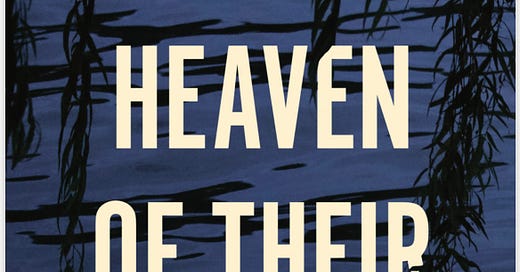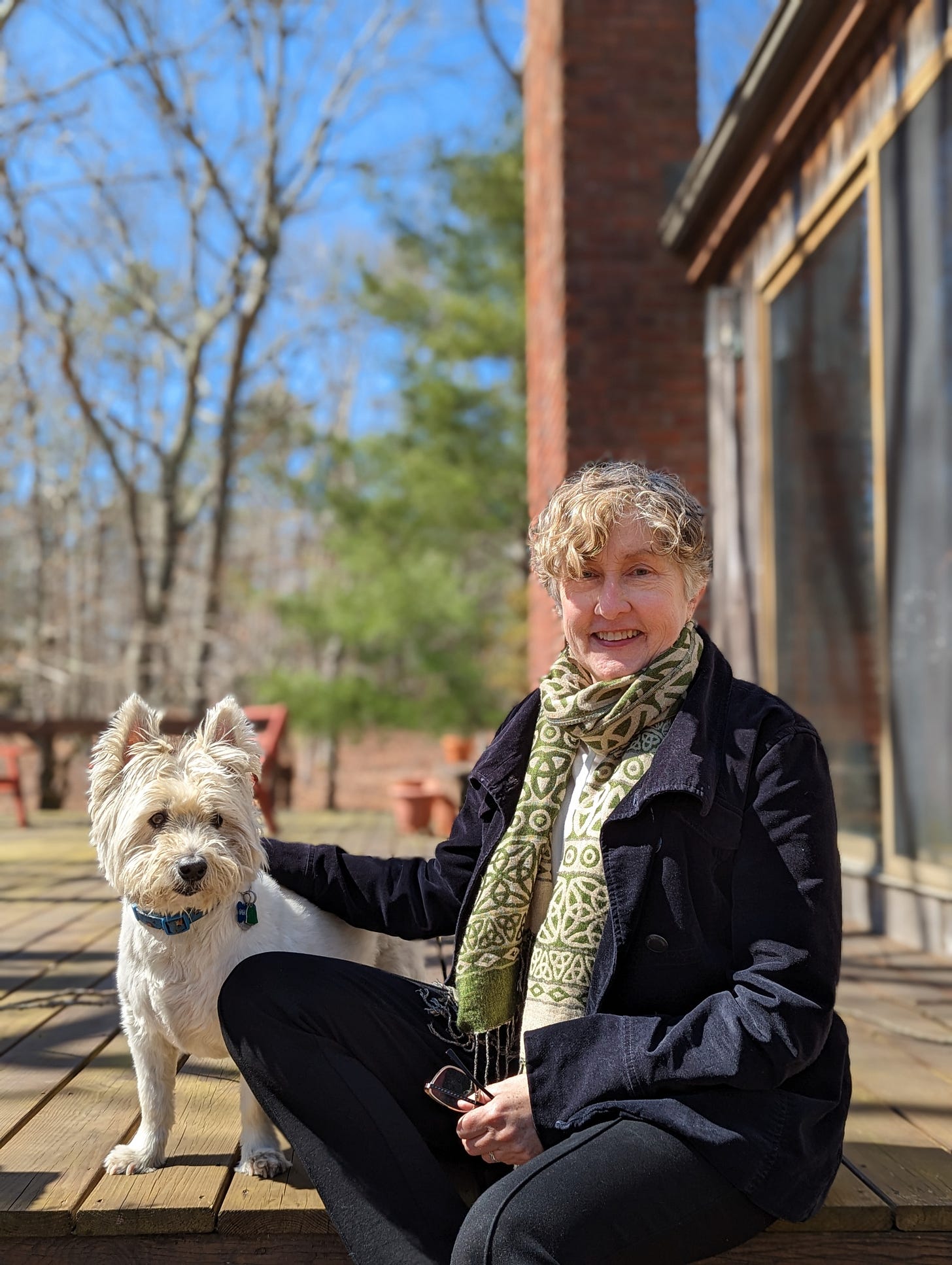Fiction writer and lifelong New Yorker Joann Smith offers her readers A HEAVEN OF THEIR CHOOSING
On parenthood, unlikeable characters, rising above it all, and shopping & shooting
If you’re in the Los Angeles area on Sunday, December 10, please join Gemini Wahhaj and me at 5 PM at Village Well Books & Coffee in Culver City (9900 Culver Blvd). We’ll be discussing Gemini’s excellent debut novel, The Children of This Madness.
Monthly and annual subscriptions to Bookish are 15% off through November 30. A preview of the most recent list of agents currently accepting queries can be accessed here. 📗
I hope you had a good Thanksgiving yesterday if you celebrated.
Joann Smith and I met in Philadelphia at an AWP conference-adjacent reading held in the majestic main Philadelphia Free Library in March 2022. Her story collection, A Heaven of Their Choosing, was published by 7.13 Books the previous fall, and I was awaiting the release of my novel in memos Please Be Advised from the same publisher.
Joann read an excerpt from her story “Taking Notes,” which is about a woman who, while packing for vacation, finds a love letter to her husband written by a female colleague. Implicit in the letter’s contents is an extramarital escapade. Joann read from the story, which is both funny and knowing in its examination of a long marriage, in an assured, lightly comic tone. I’ve been a fan ever since.
She and I corresponded recently about A Heaven of Their Choosing and the writers who have influenced her.
Christine Sneed/Bookish: Many of your stories are set in New York, the Bronx, specifically, where you’ve lived for many years and know well. In your story “Taking Notes,” however, your main characters are traveling to locales including Sedona and California’s Pacific coast. Is setting one of your primary considerations when you begin a story? Or would you say New York is your default setting?
Joann Smith: You can’t live in the Bronx for as long as I have without it getting into your blood and, as it turns out, into your writing. So, though characters tend to be the starting point for most of my stories, many of those characters come with at least a little Bronx in them.
By that I mean they are street smart; independent; often sarcastic and witty; intolerant of bullshit. They take hardship and disappointment in stride, maybe even for granted; refuse to go down for the count; and find beauty and hope in situations where others might see despair. I am endlessly fascinated by Bronx people, so I suppose that means character and setting are often intertwined in my stories.
CS: Mary Ryan, the protagonist of your story “Something Grand” a very recent widow, mourns her husband Mike’s death, but her feelings for him are complicated. It was he who their neighbors always complimented for his Sunday churchgoing, but it was Mary who trudged uphill to their parish, every single morning of the week–rain, snow, or hail. He was the parent their daughter favored too.
Mary is sympathetic but not necessarily likable in the way women are told they’re supposed to be likable. She seems to me wholly believable–why do you think we still hear so often that female characters have to be likable? (which of course is not an accurate reflection of reality.)
JS: When my daughter was little, people would often stop me to say, “I saw your husband playing with your daughter at the playground,” or “I saw your husband carrying your daughter on his shoulders.” All these comments ended with “He’s such a good father.” Of course, I was with her EVERY DAY, playing with her, feeding her, etc., etc., and no one ever stopped me or my husband to say that I was a good mother. Typical, right?
I didn’t particularly like Mary Ryan, either, and there are qualities she doesn’t like about herself, but it isn’t until her husband dies that she begins to understand how much she sacrificed in order for him to be carefree and popular. Yes, maybe her priorities were skewed; maybe she didn’t need to vacuum or clean out the refrigerator as often as she did; maybe she could have been more lenient with her daughter. And, maybe if her husband helped out more or was willing to be stricter with their daughter, Mary could have had the opportunity to be freer and happier.
I think she’s unlikeable because she didn’t rise above it all. She didn’t have to walk around with a smile on her face all the time, but we might have liked her more if she sucked it up when it came to her daughter and was satisfied to play second fiddle. I feel like society pats itself on the back for the strides we’ve made in regard to the treatment of women, but we still can’t pass the ERA and our bodies are battle zones.
Misogynists and other haters are proudly out of the closet. Mary tells the truth about her experience as a woman, wife, and mother. But a woman telling the truth is a woman complaining. We have to keep creating women characters who tell their truth and who point a finger at readers and make them think about why the truth makes the character/woman unlikeable.
CS: “Tuesday Night at the Stop n’ Shoot” is unlike any other story in A Heaven of Their Choosing. It reminded me of George Saunders’ “Sea Oak.” “Tuesday Night” has a speculative aspect to it, although it’s also very much of this world. Where did this story come from?
JS: In 2000, two men forced seven employees of a Wendy’s restaurant in Queens, N.Y., into the freezer, bound them, and shot them, and then stole $2,400. They were caught and sentenced to life in prison. You can find information on Wikipedia under “Wendy’s Massacre.”
At the time, mass shootings were much rarer than they are now, and New York has some of the strictest gun laws in the country, but with the NRA’s growing political power and their lobbying against gun control, I could only imagine gun violence getting worse. I remember thinking: two of America’s favorite pasttimes are shopping and shooting. Once I had that idea in my head, I started creating a place where the two activities could be combined. I never thought that 20+ years later, the story would still be so relevant.
CS: You teach for the Writing Institute at Sarah Lawrence College. How do you think your teaching affects your writing?
JS: I love it when students are surprised by where their stories go. When we lose ourselves in our writing, our egos and persistent critics get shut off. This moving out of the way or letting go allows the story to lead. The writing knows where it wants to go. That’s hard to convey to students until it happens to them, and then they feel as if something magical or mystical happened. Students get such a thrill when they connect to the power and mystery of writing and to a deep well of creativity in themselves they weren’t aware of. I can’t help but share their thrill.
CS: Many of your characters are Catholic, and questions of faith imbue some of these stories, but I’d characterize your work as worldly in the sense that it is of this world. They reminded me at times of William Trevor’s stories. Is his work one of your influences?
JS: I’m glad you see them as worldly. Thanks! I was raised Catholic, and I’ve struggled to find a way to separate the church -- and all the harm it’s done and continues to do -- from the religion. For a while, I thought about renouncing Catholicism. Instead, I’m always in the process of creating my own system of beliefs. I believe in something greater than us, and I’m comfortable using “God” as the name of that energy/source. Nature has become my church, and that doesn’t mean I need to be in the woods. As long as there’s a place for me to walk with trees along the way, I’m in church.
You’re so astute in asking about William Trevor and his influence. Thanks, again, for this compliment. I like to explore the ordinariness of life in both its beauty and its horror, and Trevor does this masterfully. His characters suffer heartbreak and disappointment, and Trevor lets us know this is the reality of life. But there’s a line in his story “Teresa’s Wedding” that shows the kind of restrained hopefulness his characters hold on to. In a toast to a newly married couple, a priest says, “May you meet happiness halfway.”
Happiness isn’t going to shower Trevor’s characters, and they know that. But they also know that it’s a possibility, as dim and distant as it may be, and they’ll go halfway or farther to greet it. Those are the characters and stories I’m drawn to, and when I start writing, I usually know what the sorrow is, but I never know where the happiness will be found. My characters point me to it.
Author bio: Joann Smith’s short story collection A Heaven of Their Choosing was published by 7.13 Books in September 2021. Her short fiction has been anthologized and published in many literary journals including New York Stories, Adelaide Literary Journal, and Whitefish Review. The Best American Short Stories 2000 cited one of her stories in its 100 Distinguished Stories of the Year list.
Her historical novel, When I Was Boudicca, is available for purchase. She recently completed Birthday Girls, a novel she is currently shopping. Joann is currently at work on a collection of linked stories.
She has taught creative writing for many years and mentors writers through AWP, of which she is a longtime member. She lives in the Bronx, where she finds most of her stories.
📗
Postscript: Gemini Wahhaj’s and my December 10 event flier:






I have experienced the beauty + wonder Joann referenced when you're surprised by where a story leads as you write it! I struggle with control, so this used to frustrate me. The deeper my faith has gone, the easier it has been to delight in the surprises + surrender the stories.
Thank you for sharing this with us. ✨✨✨
Great interview.